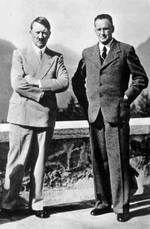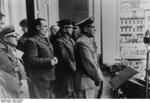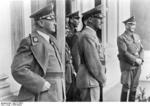Konrad Henlein
| Surname | Henlein |
| Given Name | Konrad |
| Born | 6 May 1898 |
| Died | 10 May 1945 |
| Country | Czechoslovakia |
| Category | Government |
| Gender | Male |
Contributor: C. Peter Chen
ww2dbaseKonrad Henlein was born in north Bohemian Maffersdorf, Czechoslovakia. He attended a German business academy in Liberec and served in the Austrian Army during WW1. During the inter-war years he worked for a bank in Sudetenland region of Czechoslovakia while becoming active in politics. A quarter German by blood, in mid-1930s he decided being pro-German would progress his political career. In 1933, he became a prominent figure of the pro-German Sudetendeutsche Partei, which became the second largest political party in Czechoslovakia after the 19 May 1935 election. Starting in 1938, the Nazi propaganda machine fabricated false stories of the three million ethnic Germans being oppressed in Czechoslovakia. By now the leader of the violent Sudetendeutsche Partei, Henlein instigated many incidences of these "acts of oppression". By 1938, Henlein was advertising to the world his wishes to see an independent Sudetenland, while he was secretly on Berlin's payroll and receiving directions from Adolf Hitler and Joachim von Ribbentrop. The Sudetenland issue eventually led to the Munich Agreement of 30 Sep 1938 where European powers agreed to cede the region under German control. After the annexation, the Sudetendeutsche Partei merged into the Nazi Party on 5 Nov 1938. Henlein received the title of SS Gruppenführer and, as the Gauleiter of the regional branch of the Nazi Party, governed Sudetenland. He was arrested by Allied troops at the end of the war and committed suicide at Plzeň.
ww2dbaseSources: the Last Lion, Wikipedia.
Last Major Revision: Jun 2006
Konrad Henlein Interactive Map
Photographs
 |  |  |  |
Konrad Henlein Timeline
| 6 May 1898 | Konrad Henlein was born. |
| 20 Sep 1938 | Sudeten Nazi leader Konrad Henlein urged Slovakians to demand autonomy with greater vigor. |
| 10 May 1945 | Konrad Henlein passed away. |
Did you enjoy this article or find this article helpful? If so, please consider supporting us on Patreon. Even $1 per month will go a long way! Thank you. Share this article with your friends: Stay updated with WW2DB: |
Visitor Submitted Comments
All visitor submitted comments are opinions of those making the submissions and do not reflect views of WW2DB.
» Munich Conference and the Annexation of Sudetenland
- » 1,150 biographies
- » 337 events
- » 44,024 timeline entries
- » 1,241 ships
- » 350 aircraft models
- » 207 vehicle models
- » 375 weapon models
- » 123 historical documents
- » 260 facilities
- » 470 book reviews
- » 28,582 photos
- » 432 maps
James Forrestal, Secretary of the Navy, 23 Feb 1945
Please consider supporting us on Patreon. Even $1 a month will go a long way. Thank you!
Or, please support us by purchasing some WW2DB merchandise at TeeSpring, Thank you!
28 Apr 2010 11:52:42 AM
The Sudeten Germans wanted home rule after the end of World War 1, which they were not granted. Otherwise it would not have been so easy for Henlein to get to power. Unsolved issues of that time are still a source of heavy conflicts in Eastern Europe. People were denied home rule or independence, e.g. Hungarians